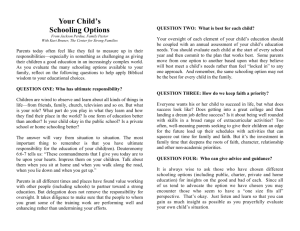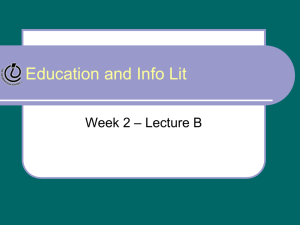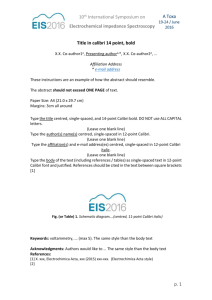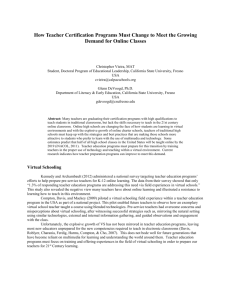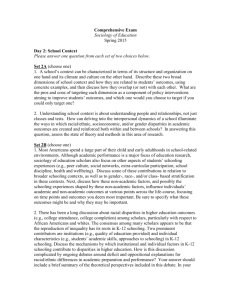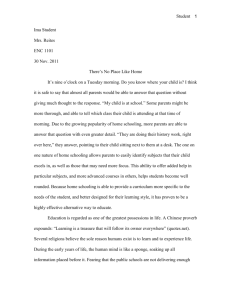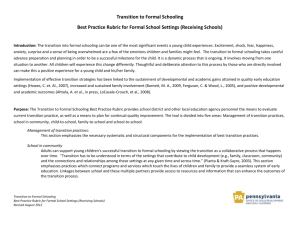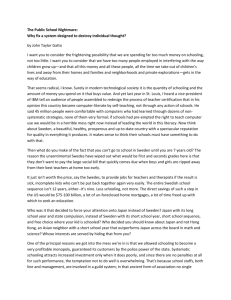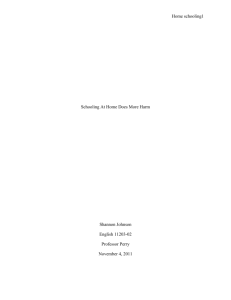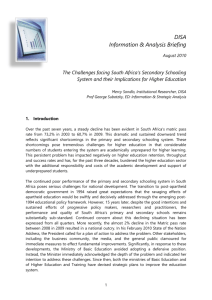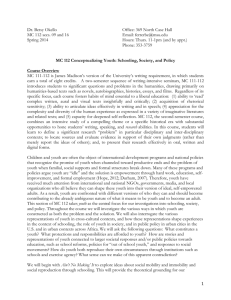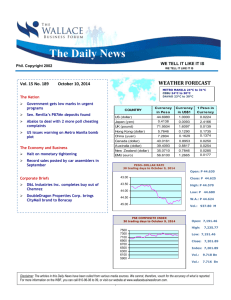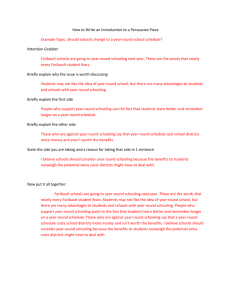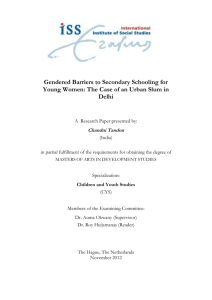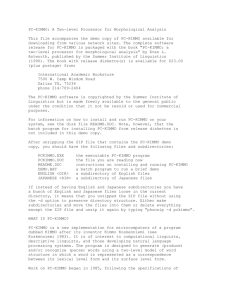Detailed instructions for the Writing Composition
advertisement
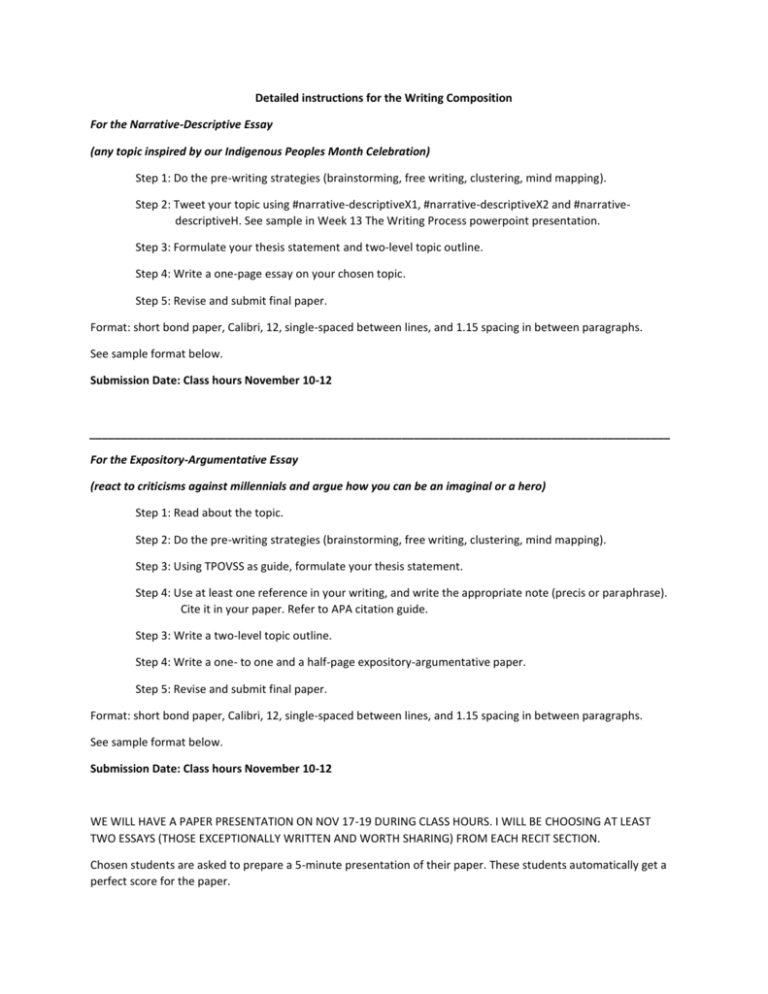
Detailed instructions for the Writing Composition For the Narrative-Descriptive Essay (any topic inspired by our Indigenous Peoples Month Celebration) Step 1: Do the pre-writing strategies (brainstorming, free writing, clustering, mind mapping). Step 2: Tweet your topic using #narrative-descriptiveX1, #narrative-descriptiveX2 and #narrativedescriptiveH. See sample in Week 13 The Writing Process powerpoint presentation. Step 3: Formulate your thesis statement and two-level topic outline. Step 4: Write a one-page essay on your chosen topic. Step 5: Revise and submit final paper. Format: short bond paper, Calibri, 12, single-spaced between lines, and 1.15 spacing in between paragraphs. See sample format below. Submission Date: Class hours November 10-12 _____________________________________________________________________________________________ For the Expository-Argumentative Essay (react to criticisms against millennials and argue how you can be an imaginal or a hero) Step 1: Read about the topic. Step 2: Do the pre-writing strategies (brainstorming, free writing, clustering, mind mapping). Step 3: Using TPOVSS as guide, formulate your thesis statement. Step 4: Use at least one reference in your writing, and write the appropriate note (precis or paraphrase). Cite it in your paper. Refer to APA citation guide. Step 3: Write a two-level topic outline. Step 4: Write a one- to one and a half-page expository-argumentative paper. Step 5: Revise and submit final paper. Format: short bond paper, Calibri, 12, single-spaced between lines, and 1.15 spacing in between paragraphs. See sample format below. Submission Date: Class hours November 10-12 WE WILL HAVE A PAPER PRESENTATION ON NOV 17-19 DURING CLASS HOURS. I WILL BE CHOOSING AT LEAST TWO ESSAYS (THOSE EXCEPTIONALLY WRITTEN AND WORTH SHARING) FROM EACH RECIT SECTION. Chosen students are asked to prepare a 5-minute presentation of their paper. These students automatically get a perfect score for the paper. Jomari Binay November 25, 2014 2014-61702 X1-1R Is a college degree less valuable nowadays? Thesis Statement: Despite the notion that increased education is preferable, college degree seems to have been devalued at present, as evidenced by the quest-- for diploma as a mere paper chase and the restrictive nature of schooling; thus, there is a need to learn the revolutionary challenge of knowledge. I. Issue of whether education has been devalued II. What supporters of education say A. Higher education as doors to opportunities B. Diplomas and degrees as status symbols III. Who the real “educated” individuals are A. Great people who never finished schooling B. Influential people who have no MAs or PhDs IV. Why students in college are being sold an illusion A. Misled to believe that diploma is equal to society acceptance B. Fitted like square pegs into round holes V. How education limit people’s abilities A. Training in low levels and restricted activities B. Brainwashing aided by years of schooling VI. Emphasis on the need to revolutionize education Jomari Binay November 25, 2014 2014-61702 X1-1R Is a college degree less valuable nowadays? Today, it seems to be universally accepted that increased education is a good thing. Thousands of colleges and millions of students spend vast amounts of time and money chasing pieces of paper. But what is the value of these qualifications? This essay will discuss whether education has been devalued. Supporters of education (usually teachers or educators, or those in the business of education) say that increased levels of education will open doors for students. Certificates, diplomas, and degrees are held up as a status symbol, a passport to a private club of money and power. However, the truly powerful are not those with degrees, but people who stand back and look at what is really important in life. These people are found in every part of society. Like many brilliant people, Einstein was a weak math student. Like many successful businessmen, Bill Gates never completed college. Like many inventive and creative people, Edison never went to school. The greatest religious teachers do not have letters after their name. Similarly, many of the world’s political leaders do not have master’s degrees or doctorates. These are the people who shape our lives, and they are too busy with real life to spend time in the paper chase. Students in college are being sold an illusion. They are made to believe that self-understanding and society approval will come with the acquisition of a piece of paper. Instead of thinking for themselves, and finding their own personality and strengths, they are fitted like square pegs into round holes, in so-called professional jobs. The role of education is to prepare masses of people to operate at low levels of ability in a very limited and restricted range of activities (Mills, 2013). Some of these activities are perhaps more challenging than the assembly lines of the past, but the ultimate purpose is equally uninteresting. More worryingly, despite the increased level of education, people are still not genuinely expected to think for themselves. In fact, the longer years of schooling make the job of brainwashing even easier. There is still a role for study, research, and education. However, we need to examine our emphasis on education for the sake of a piece of paper, and to learn the real meaning and revolutionary challenge of knowledge. Reference: Mills, B. (2013). Creativity in peril: Challenge to educators in the 21st century classroom. Bellmont, CA: Blackwell Publishing.




